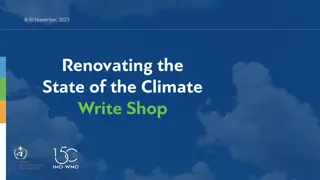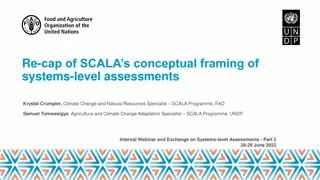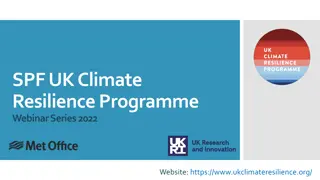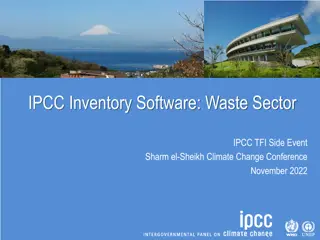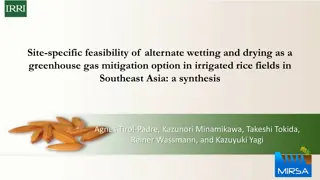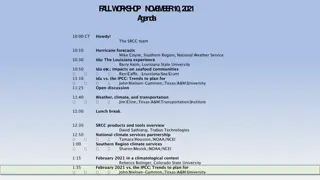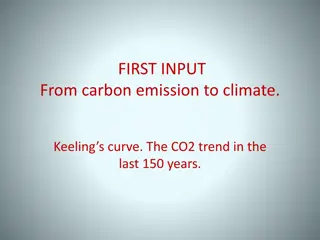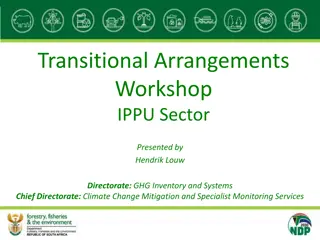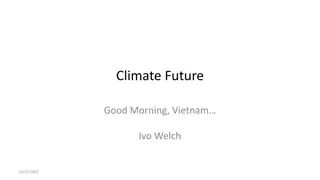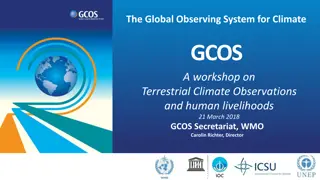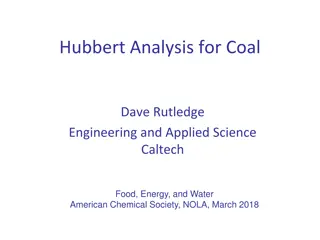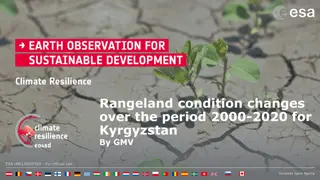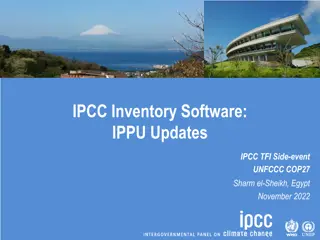Urgency of Climate Action and Pathways to Achieve Targets
Insights from the IPCC Sixth Assessment Reports highlight the pressing need for accelerated global action to limit warming, as current efforts fall short of the Paris Agreement targets. Solutions exist across sectors to halve emissions by 2030, offering benefits in health, equity, justice, and econo
0 views • 12 slides
Global Climate Models
Scientists simulate the climate system and project future scenarios by observing, measuring, and applying knowledge to computer models. These models represent Earth's surface and atmosphere using mathematical equations, which are converted to computer code. Supercomputers solve these equations to pr
3 views • 15 slides
Future Directions in Climate Reporting: Key Questions and Scenarios
Paper from Plenary-1 explores key questions on the benefits of global/regional reports, uniqueness of WMO, IPCC, & BAMS reports, data management, impact communication, attribution, uncertainties, and positive information sharing. Deliverable 2 outlines scenarios optimizing report overlap, proposing
2 views • 7 slides
Transformative Strategies for Climate Change Adaptation in Food Systems
Evolving theories of transformational change emphasize the importance of transformative actions in addressing climate change impacts on agri-food systems. The IPCC AR6 report highlights the need for system-wide shifts to mitigate GHG emissions and enhance resilience in the face of escalating climate
0 views • 8 slides
UK Climate Resilience Programme Webinar Series 2022
The UK Climate Resilience Programme is hosting a webinar series featuring prominent speakers discussing key topics related to climate change adaptation, impacts, and decision-making options. Presentations and Q&A sessions will cover insights from the IPCC WGII report, projected risks associated with
1 views • 10 slides
IPCC Inventory Software Enhancements for Waste Sector Emissions Estimation
Explore the latest enhancements in the IPCC inventory software related to waste sector emissions estimation. Major updates include subnational disaggregation, Tier 3 methods, wetlands supplement, and improvements in worksheet structure and layout. The software allows for detailed estimation of green
1 views • 10 slides
Feasibility of Alternate Wetting and Drying as a GHG Mitigation Option in Rice Fields
This synthesis study explores the site-specific feasibility of alternate wetting and drying (AWD) as a greenhouse gas mitigation option in irrigated rice fields in Southeast Asia. The research analyzes the impact of environmental and soil properties on GHG mitigation, evaluates trade-offs and co-ben
1 views • 19 slides
Climate Trends and Impacts in North America
The workshop held at SRCC discussed various climate-related topics, including hurricane forecasts, impacts on seafood communities, and trends in weather, climate, and transportation. Presentations highlighted the importance of planning for climate changes as outlined by the IPCC reports. The content
0 views • 11 slides
Communication Protocols for System Integration
This technical document explores various communication protocols used for system integration, focusing on mailbox communication, interprocessor communication, system communication using IPCC, and BLE communication utilizing different IPCC channels. The document delves into the features, functions, a
1 views • 6 slides
Impact of Human Activities on Climate Change: IPCC Reports and Trends
The IPCC Fifth Assessment Synthesis Report highlights the clear influence of human activities on the climate system. Data reveals a consistent rise in global temperatures over the past 150 years, with each decade warmer than the last. The IPCC emphasizes the urgency to limit climate change to build
0 views • 50 slides
Transitional Arrangements Workshop in IPPU Sector
Activities in various industries such as Mineral, Chemical, Metal, and more are affected by the Transitional Arrangements presented in the workshop. Data providers are expected to use Tier 2 emissions factors and follow newly published Methodological Guidelines for accurate reporting. The workshop o
0 views • 16 slides
Climate Future Discussion: Global Warming and Future Projections
The climate discussion presents images and text highlighting rising GHG concentrations, global temperature history, and IPCC projections for the future. It emphasizes the urgent need for action to combat climate change and mitigate its effects in the coming years.
0 views • 63 slides
The Global Observing System for Climate and Terrestrial Climate Observations
The Global Observing System for Climate (GCOS) plays a crucial role in observing climate-related variables globally. Established in April 1992, GCOS focuses on what, how, and where to measure, sustain measurement, manage change, data transmission, management, rescue, and access. It addresses concern
0 views • 17 slides
Insights into Global Energy Production Trends and Environmental Impacts
Exploring historical world energy production data, Hubbert analysis for coal, and the global carbon cycle from the IPCC 5th Assessment Report. The discussion includes the longevity of fossil fuels, the rise of hydrocarbons, per-person energy production, and the shift towards universal electricity ac
0 views • 33 slides
Rangeland Condition Changes in Kyrgyzstan 2000-2020 Analysis
Detailed analysis of rangeland condition changes in Kyrgyzstan from 2000 to 2020 utilizing remote sensing data and local information. Focus on impact assessment, climate resilience, and poverty reduction. Data processing involved calculation of various vegetation indices and degradation assessment f
0 views • 16 slides
IPCC Inventory Software and Updates for COP27 Side-event
IPCC Inventory Software and IPPU Updates offer new features like higher tiers, category subdivisions, and options for selecting production processes and materials. Users can access various worksheets for different industrial sectors like Mineral, Chemical, Metal, Electronics, and more, with detailed
0 views • 16 slides


